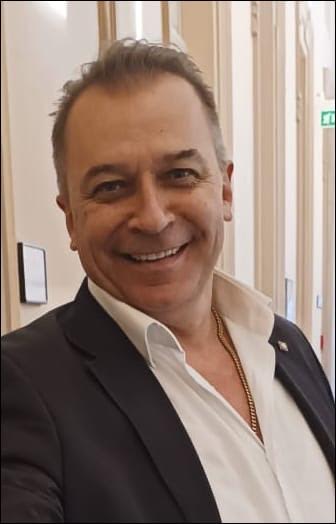Paolo Bongioanni In this legislature he was the president of the Fratelli d’Italia group in the Piedmont Regional Council. In 2019 he was elected at Palazzo Lascaris for the Cuneo constituency, and will stand again in the regional elections on 8 and 9 June.
He talks to Targatocn about the work accomplished and his ideas for Piedmont in the coming years.
Who is Paolo Bongioanni?
«I was born in Cuneo on 11 June 1966. I carried out my military service in the Carabinieri as a CAR at the Fossano barracks. A learning experience that taught me a lot. After high school in Mondovì I graduated in 1993 in Geological Sciences at the University of Turin. Immediately after graduating I worked for four years in agricultural employers’ associations».
«In March 1998 I began my career at the Local Tourist Agency of Cuneo, where I was general manager for 21 years until 2019, when I ran for office in the Region. A beautiful job which gave me the opportunity to conceive and develop many events which today have become the basis of Cuneo tourism, including the Cuneo Brown Fair since 1999, the Cuneo Walk & Bike show in 2004 and 2005, the Cuneo stage of the Tour de France in 2008 and four stages of the Giro d’Italia from 2010 to 2019. I was the first to theorize the outdoors as a tourist tool: the maximum expression was the creation of the Via del Sale between Limone Piemonte and Monesi di Triora , which is the first tourist route in Europe of this type, regulated and tolled, which was followed by many others».
«An important component of my life is sport. I was a professional athlete in combat sports such as kickboxing, boxing and MMA. I am passionate about the sea, freediving, skiing and motorbikes. In 2015 I also published the sports novel Il Bianco e il Nero. I love my province, its people, its entrepreneurs, its mountains, its hills, its plains. I live in Villanova Mondovì and I have two children: Paola, 24, who taught me love, and Franco, 10, who taught me the meaning of life. And I am lucky enough to still have my parents, 85-year-old mother Silvana and 89-year-old father Franco».
Let’s start from his work in recent years in the Regional Council. What were the strong points?
«They have been five years of constant commitment and without breaks. It certainly remains very memorable when Covid has put people, businesses and an entire economic system in the face of an unprecedented emergency. It was the moment in which I was able to make available the relationship I had developed with the territory and my managerial experience to devise solutions that allowed us to support the prompt restart».
«One day, at the beginning of the first lockdown, President Alberto Cirio called me. He asks me to help him put together the Region’s intervention to support businesses paralyzed by Covid. A shock was needed. Thus was born the maxi-project that we called “Riparti Piemonte” and which we translated into the two regional laws 12 and 13 of 2020. Thanks to them, the business system was able to enjoy bonuses that allowed the restoration of the most diverse production sectors , and in many cases to save them. A provision that then became a lesson throughout Italy».
Which sectors have benefited from it?
«Everyone. We have helped tourism businesses with 10,734,000 euros, amateur sports associations and clubs with 4,350,000, and established a guarantee fund of 5 million euros to advance redundancy payments to employees. We have provided bonuses from 800 to 2,500 euros per capita for categories that – today we no longer even remember! – Covid had literally paralyzed. Restaurants and bars, street vendors, hairdressers and beauty services, tourist guides, discos and dance halls, tattoos and piercings and much more».
«Another act of post-Covid restart bears my signature: from 8 April 2023, after twelve years of closure and important restoration works, I reopened the Royal Castle of Casotto to the public. Already in 2020, in the midst of the pandemic, I reported the Ferragosto Concert inside the Castle with the RAI cameras live nationally which made it known everywhere».
(Paolo Bongioanni with minister Guido Crosetto)
Another measure associated with his name is the Tourism Voucher, which relaunched Piedmontese tourism after the pandemic. What is your opinion?
«The Tourism Voucher was one of the best operations I carried out in the entire legislature. Born in the midst of an emergency, it relaunched Piedmontese tourism and allowed money to be put into circulation when we couldn’t move and tourism couldn’t be practiced. It is another formula that has made its mark and was awarded in Rome as the best measure in Italy proposed by a Region. Since the first year it has foreseen the “buy one, get three and consume whenever you want” formula. A three-night stay in Piedmont with one paid by the visitor, one offered by the structure and one paid by the Region. Its success meant that the proposal was also renewed for 2024 and extended not only to overnight stays, but also to the purchase of tourist services such as guides and companions».

(Paolo Bongioanni in the Regional Council)
Regional law 9 of 2021 for the valorisation of historic mountain roads of tourist interest, the so-called “white roads”, also bears his signature. A heritage that – as you told us – you began to recover already as director of the Atl with the Via del Sale, which later proved to be a successful model and trailblazer. What has been done since then?
«Law 9 introduced the census and inclusion of historic mountain roads in a special “land registry”, their recovery and maintenance to allow regulated access and use on foot, by bicycle, enduro motorbike, quad and 4×4 . It allocates one and a half million for interventions every year. Dozens have already been financed».
«Alongside this, another measure of mine which intervenes in the same sector and of which I am very proud is that on water fees, which transfers 4 million euros to the mountain municipalities of the province of Cuneo every year, of which 90% for interventions on roads asphalted and 10% on dirt roads. Thanks to it, we were able to achieve the complete recovery of the Colle Fauniera road system with 3.8 million euros: two million on the Castelmagno side, 1.2 on the Demonte side and 600 thousand on the Marmora side. The 2023 tourism data in Piedmont literally speaks of a boom for mountain roads. The Via del Sale, the Colle dello Jafferau, the Strada dei Cannons, the roads of Assietta, the Strada della Gardetta today are extraordinary products that have crossed the Italian borders to become attractive and competitive on international markets in the summer mountain segment, which it didn’t exist before and today it has become a new protagonist in the tourist offer of Piedmont».

(Paolo Bongioanni with deputy minister Maurizio Leo)
Are there other regional laws that bear your signature?
«The 2020 one which allows mountain municipalities to dispose of woodland material residues by way of exception through the eco-sustainable practice of plant burning and which this year, thanks to an amendment of mine, in the penultimate session of the regional council I also managed to extend to the municipalities of hills and plains. The 2023 law establishes the Piedmontese wood supply chain and supports all the industrial segments of the sector, from forestry to carpentry up to “made in Piedmont” furniture. Another law of 2024 of mine reforms and updates the profession of ski instructor after over thirty years and makes training mandatory. And I have had a law approved which introduces reforms into the Statute and Regulations of the Regional Council to make the functionality of the regional machine more fluid and government action more incisive.».

In your opinion, what was the key, the working method that allowed you to achieve these results?
«I have no doubts: the comparison and continuous listening to the territory and the people. Entrepreneurs, professionals, local administrators, trade associations, volunteers, families, women and men. Practically every day of these five years I have met hundreds of companies and production activities. I went to visit them one by one. I learned their success stories and their struggles. Only by listening do you really understand what is needed. And only then can we begin to write the laws, the notices and the provisions. The most important thing is that political choices are always made together with the territory and in dialogue with it, and not behind a desk».

Let’s come to the future. A new regional legislature will emerge from the polls on 8 and 9 June. What are the first commitments you have already put on your diary?
«First of all, guarantee the continuity of the results obtained and ensure the refinancing of the approved laws: the tourism voucher, those on the wood supply chain, on mountain roads and on water fees. And then I would like the historic Law 18 to support accommodation facilities to be refinanced as early as autumn 2024. These are all commitments that so far have found the constant support of the Council of President Alberto Cirio, and in the national government of Giorgia Meloni – in particular in the minister Guido Crosetto – an attentive and present interlocutor, always ready to listen and take charge of the problems of the Cuneo area».
The big theme for Piedmont in the coming years is the elimination of healthcare waiting lists. What is your idea?
«I believe there is only one system, which is that of a radical redevelopment of local healthcare with a network of widespread and local structures. The resources are there, but you need to have the ability and courage to do it».

Do you already have plans for new regulatory proposals in other sectors?
«We need a decisive change of direction for disadvantaged areas, and in particular mountain areas. We need to restructure effective governance which can only involve a return to the mountain communities. We have seen that the system of mountain unions has in most cases proved to be a failure. It is a necessary intervention that must be done with respect for those who live and work in the mountains».
«We will certainly then need to study the possibility of giving life to the short agricultural supply chain in Piedmont. It means linking that part of the agricultural sector which has experienced serious suffering in recent years with the retail trade, which is also going through a moment of extreme difficulty, and with the catering industry. And this with the aim of activating a circuit which, through a contribution formula, allows producers to sell at more advantageous prices than those charged by large-scale distribution».
And what about the specific areas of tourism and sport?
«We must have the courage to implement a total tourism reform. Go and plan promotional interventions no longer on a territorial basis as has been done so far but on the basis of the product. Tourist products – food and wine as well as outdoor – are characterized by an important transversality and a geographical location that goes beyond the administrative boundaries of Atl and provinces, which are not of interest to tourists. And therefore they must be overcome for a more flexible organization that adheres to market changes».

«And finally the investment in sport for young people. We must activate a reward policy towards the youth sectors of any discipline and type of sport, because from sports training comes one of the greatest gifts and values that we can offer to ourselves, to the new generations and to our children. All these objectives, I want to reiterate, cannot be achieved except through listening. Listening is fundamental because policies can never be imposed from above but must always be built from the base».












